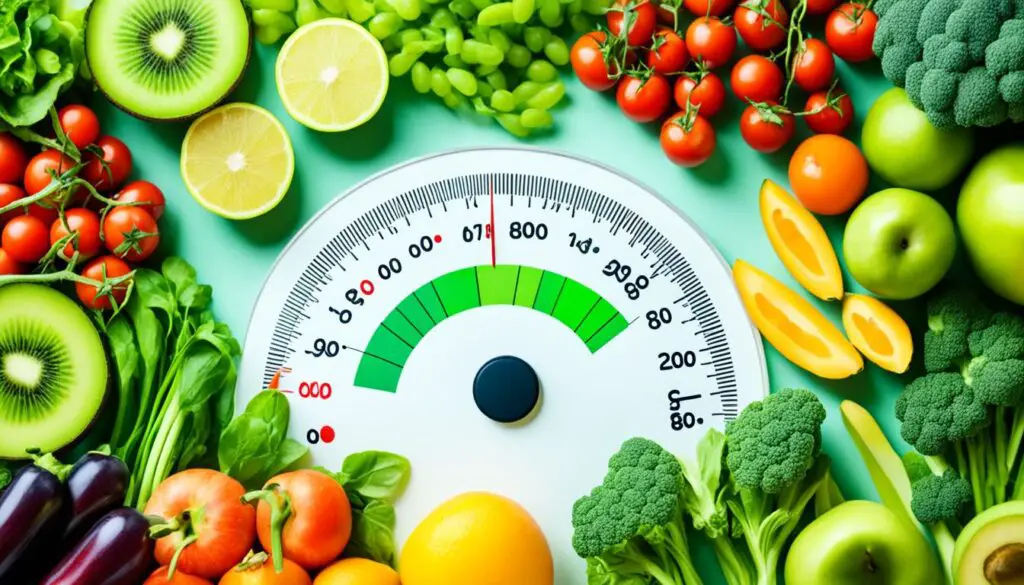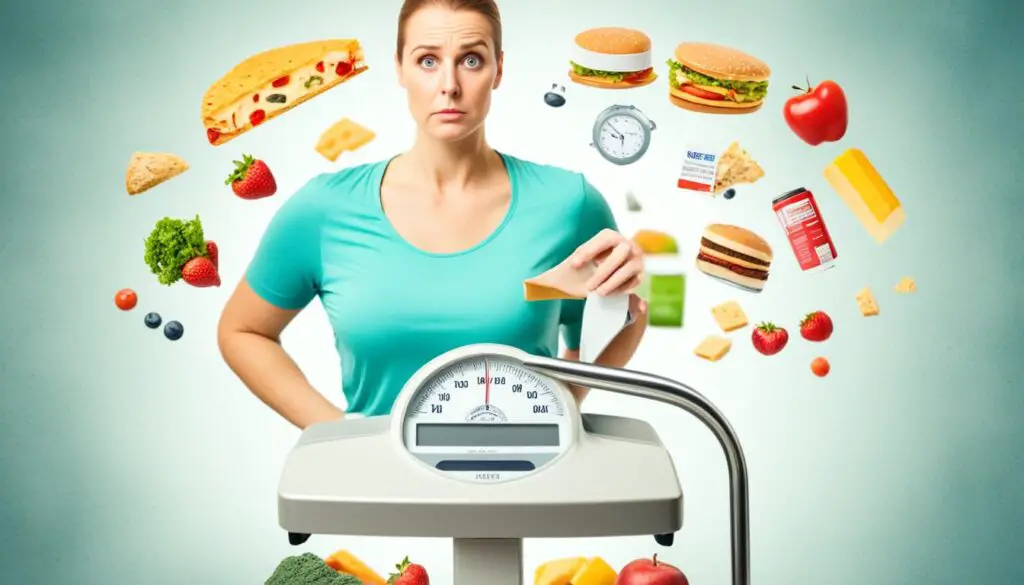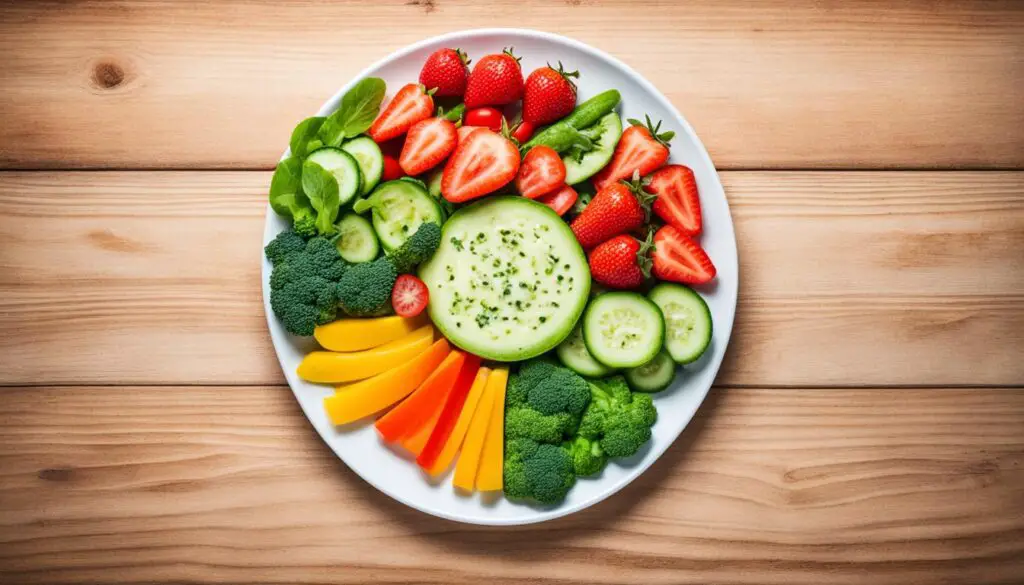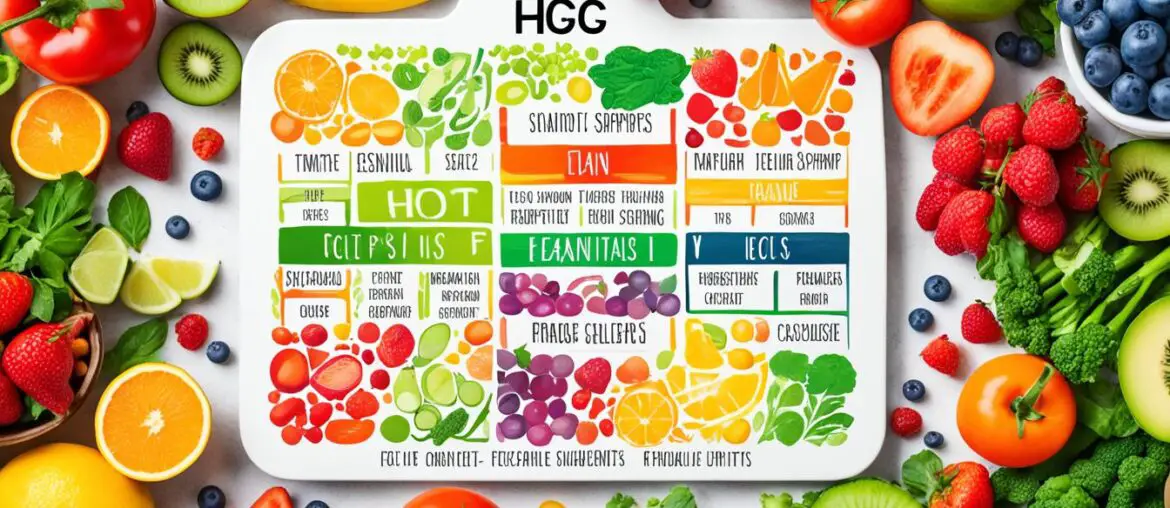Did you know that the HCG Diet, a popular weight loss protocol, allows only 500-800 calories per day? This highly restrictive diet has gained attention for its rapid weight loss results, but it comes with its own set of challenges and risks.
When it comes to the HCG Diet, proper meal planning and a well-stocked pantry are crucial for success. By knowing the essential HCG Diet shopping list items and making smart food choices, you can stay on track towards your weight loss goals.
Key Takeaways:
- Understanding the HCG Diet and its restricted calorie intake is essential for success.
- Creating a shopping list of HCG Diet-approved foods is key to staying on track.
- Focus on lean proteins, non-starchy vegetables, limited fruits, and specific beverages.
- Be aware of potential risks and challenges associated with the HCG Diet.
- Consult with a healthcare professional for personalized guidance and support.
Understanding the HCG Diet
The HCG Diet, developed by British physician Albert Simeons in the 1950s, is a very low-calorie diet that utilizes supplemental HCG injections as a weight loss strategy. The premise of the diet is based on the claim that HCG injections stimulate weight loss by burning stored body fat. However, it is important to note that there is no scientific evidence to support these claims, and the FDA has not approved the use of HCG for weight loss.
The recommended foods on the HCG Diet are subjective and include lean proteins, non-starchy vegetables, limited fruits, and certain beverages. The diet is highly restrictive, with a calorie intake typically ranging from 500 to 800 calories per day. While this restrictive approach may lead to weight loss, it can also result in nutrient deficiencies due to the severe calorie restriction.
Is the HCG Diet Safe?

The safety of the HCG Diet is a topic of concern among healthcare professionals and nutrition experts. While HCG is a hormone naturally produced during pregnancy, the long-term risks of daily exogenous HCG use are unknown. The diet’s severe calorie restriction can lead to nutrient deficiencies and is not sustainable in the long run.
The FDA has not approved HCG for weight loss, and registered dietitians unanimously agree that the diet is dangerous and should not be recommended. Very low-calorie diets like the HCG Diet pose a risk for nutrient deficiencies and can increase the risk of developing other diseases. Additionally, the diet may result in disordered eating behaviors and have negative effects on metabolism and hormones.
Potential Risks of the HCG Diet
1. Nutrient deficiencies: The severe calorie restriction of the HCG Diet can lead to inadequate intake of essential nutrients, vitamins, and minerals.
2. Rapid weight loss: The HCG Diet promotes rapid weight loss, which can have detrimental effects on the body, including muscle loss and a slowed metabolism.
3. Unknown long-term health risks: Daily exogenous HCG use for weight loss is not supported by scientific evidence, and its potential long-term effects on overall health are unknown.
4. Lack of FDA approval: The FDA has not approved the use of HCG for weight loss due to insufficient evidence and potential risks.
“Very low-calorie diets like the HCG Diet are not sustainable and pose significant health risks. It is essential to prioritize long-term health and consult with healthcare professionals for safe and effective weight loss strategies.”
| Potential Risks of the HCG Diet | Explanation |
|---|---|
| Nutrient deficiencies | The severe calorie restriction can lead to inadequate intake of essential nutrients, causing deficiencies. |
| Rapid weight loss | The HCG Diet promotes rapid weight loss, which may result in muscle loss and a slowed metabolism. |
| Unknown long-term health risks | The effects of daily exogenous HCG use for weight loss on long-term health are not well-researched or understood. |
| Lack of FDA approval | The FDA has not approved the use of HCG for weight loss, raising concerns about its safety and efficacy. |
In summary, the HCG Diet is associated with potential risks, including nutrient deficiencies, rapid weight loss, and unknown long-term health effects. As a diet that lacks FDA approval and is deemed unsafe by healthcare professionals, it is crucial to prioritize health and seek alternative, sustainable weight loss approaches.
Comparing the HCG Diet to Other Low-Calorie Diets
When exploring different low-calorie diets, such as the ketogenic diet, Dukan Diet, and intermittent fasting, the HCG Diet often arises as a point of comparison. While these diets share some similarities, the HCG Diet sets itself apart with its extreme calorie restriction. With a daily calorie intake of just 500-800 calories, the HCG Diet bears resemblance to the concept of intermittent fasting, which involves periods of severe calorie restriction.
However, studies have shown that relying solely on low-calorie diets and reducing calorie intake is not sustainable for long-term weight loss. It is essential to consider alternative mechanisms for weight control that do not involve such severe calorie restriction.
| Low-Calorie Diet | Calorie Intake | Main Principles |
|---|---|---|
| HCG Diet | 500-800 calories per day | Extreme calorie restriction, focus on specific food choices |
| Ketogenic Diet | Varies, typically 1,500-2,000 calories per day | High-fat, low-carbohydrate approach to induce ketosis |
| Dukan Diet | Varies, involves different phases | High-protein, low-carbohydrate diet with gradual reintroduction of other foods |
| Intermittent Fasting | Varies, involves fasting periods and eating windows | Alternate between periods of eating and fasting |
Table: A Comparison of Different Low-Calorie Diets
As seen in the table, while the HCG Diet exhibits an extreme calorie restriction, other low-calorie diets like the ketogenic diet and Dukan Diet allow for a more moderate calorie intake. It is important to note that each diet has its own principles and approach to weight loss.
In summary, when considering weight loss options, it is crucial to recognize that extreme calorie restriction, such as that seen in the HCG Diet, may not be sustainable or effective in the long term. It is advisable to explore other proven strategies for weight management while consulting with a healthcare professional to ensure a safe and healthy approach to reaching your weight loss goals.
The Challenges and Risks of the HCG Diet

Following a diet with only 500 calories per day can be challenging and is not recommended without medical supervision. The HCG Diet poses risks for nutrient deficiencies, side effects such as fatigue, irritability, and nutrient deficiencies. There have been reports of serious adverse reactions, including pulmonary embolism and cardiac arrest. The HCG injections themselves carry risks of pain, bruising, and infection. The diet’s restrictive nature can also affect mood and increase the likelihood of weight regain. Health care professionals caution against the use of the HCG Diet and recommend more sustainable approaches to weight loss.
The Impact of Severe Calorie Restriction
One of the primary challenges of the HCG Diet is the significant calorie restriction. Consuming only 500 calories per day can lead to feelings of hunger, weakness, and low energy levels. This level of calorie intake is well below the recommended amount for most individuals and can result in nutritional imbalances and nutrient deficiencies. It is difficult to obtain all the necessary vitamins, minerals, and macronutrients on such a low-calorie diet, which may negatively impact overall health and wellbeing.
Side Effects and Health Risks
The HCG Diet has been associated with a range of side effects, including fatigue, irritability, headaches, and dizziness. These symptoms can significantly impact daily functioning and quality of life. Additionally, there have been reports of more severe adverse reactions, such as pulmonary embolism and cardiac arrest, although these cases are rare.
Furthermore, the HCG injections themselves carry their own set of risks. These injections can cause pain, bruising, and the risk of infection at the injection site. It is crucial to note that HCG injections are not approved by the FDA for weight loss purposes, raising concerns about their safety and effectiveness.
Mood and Weight Regain
The strict nature of the HCG Diet and the extreme calorie restriction can have an impact on mood and mental well-being. Many individuals may experience increased irritability, mood swings, and difficulty concentrating while following such a low-calorie diet. Moreover, the drastic reduction in calorie intake often leads to rapid weight loss, but many individuals find it challenging to maintain these results in the long term. Weight regain is commonly reported after completing the HCG Diet, which can be discouraging and frustrating for those seeking sustainable weight loss.
Given the numerous challenges and potential risks associated with the HCG Diet, it is important to approach weight loss with caution and seek guidance from healthcare professionals. More sustainable and evidence-based approaches to weight loss, such as balanced nutrition, regular physical activity, and behavioral changes, are recommended for long-term success.
The hCG Diet Grocery List
https://www.youtube.com/watch?v=F7gDIshc-S0
Creating an hCG Diet meal plan starts with a hCG-friendly grocery list. It’s important to choose foods that align with the guidelines of the hCG Diet to ensure success and effectiveness. Here’s a breakdown of the key components to include in your shopping list:
Lean Proteins
Lean proteins are an essential part of the hCG Diet. They provide the necessary building blocks for your body while keeping your calorie intake low. Here are some lean protein options to include in your grocery list:
- Beef
- Chicken
- Seafood (such as fish, shrimp, and crab)
Non-Starchy Vegetables
Non-starchy vegetables are rich in nutrients and low in calories, making them perfect for the hCG Diet. They provide essential vitamins and minerals while keeping you full and satisfied. Consider adding these non-starchy vegetables to your grocery list:
- Lettuce
- Spinach
- Cucumbers
- Tomatoes
Fruits
While fruits are generally limited on the hCG Diet due to their natural sugar content, there are still some options that you can enjoy in moderation. These fruits can add a touch of sweetness to your meals:
- Apples
- Berries (such as strawberries, blueberries, and raspberries)
- Citrus fruits (such as oranges and grapefruits)
Beverages
Staying hydrated is crucial during the hCG Diet. Here are some beverage options that you can include in your grocery list:
- Water
- Coffee (without sugar or cream)
- Tea (unsweetened)
Foods to Avoid
While making your grocery list, it’s essential to be aware of the foods to avoid on the hCG Diet. These include:
- Fats and oils
- Added sugars
- Alcohol
- Desserts and sweets
By keeping this hCG Diet grocery list in mind, you can ensure that your meal plan is filled with nutritious and compliant foods. Planning ahead and carefully selecting the right ingredients will set you up for success on your hCG Diet journey.
Sample hCG Diet Meal Plan

The hCG Diet consists of three distinct phases: the loading phase, the weight loss phase, and the maintenance phase. Each phase has specific guidelines and dietary recommendations to ensure successful outcomes and optimize weight loss progress.
1. Loading Phase
The loading phase marks the beginning of the hCG Diet journey. During this phase, individuals are encouraged to consume high-calorie and high-fat foods to prepare the body for the subsequent weight loss phase. This phase typically lasts for two days and helps to build up fat stores that will be utilized during the next phase.
2. Weight Loss Phase
The weight loss phase is where the real transformation occurs. This phase involves following a strict 500-calorie meal plan while receiving daily hCG injections or taking hCG drops. The primary focus is on consuming lean proteins, non-starchy vegetables, and limited fruits. These choices help to sustain energy levels while promoting fat burning and weight loss.
During the weight loss phase, it’s important to adhere to the recommended calorie restriction and portion sizes. Here is an example of a sample meal plan for a typical day:
| Meal | Food |
|---|---|
| Breakfast | Spinach omelet with cherry tomatoes |
| Lunch | Grilled chicken breast with mixed green salad |
| Snack | Apple slices |
| Dinner | Grilled white fish with steamed asparagus |
| Snack | Strawberries |
3. Maintenance Phase
The maintenance phase is the final stage of the hCG Diet. It aims to establish a new set point for maintaining the achieved weight loss. During this phase, calorie intake gradually increases, and additional foods are introduced while avoiding sugar and starchy foods. The focus shifts towards maintaining a healthy and balanced diet without regaining the weight lost during the program.
It’s crucial to have a strategic meal plan in place for each phase to ensure compliance and success. Planning meals ahead of time can help individuals stay on track with the hCG Diet and achieve their weight loss goals.
Conclusion
The HCG Diet may promise rapid weight loss, but it’s important to weigh the risks and challenges associated with this approach. The severe calorie restriction, limiting intake to only 500-800 calories per day, can lead to nutrient deficiencies and potentially harm your health in the long run. It is not a sustainable way to lose weight.
Health care professionals and nutrition experts strongly advise against the use of the HCG Diet. Instead, they recommend seeking sustainable weight loss strategies that prioritize overall well-being. It’s crucial to consult with a health care professional who can provide guidance and support tailored to your individual needs and goals.
When it comes to achieving and maintaining a healthy weight, there is no quick fix. Sustainable weight loss involves making lifestyle changes, including adopting a balanced diet and regular physical activity. By focusing on long-term habits, you can achieve lasting results and improve your overall health.
FAQ
What are the essentials for an effective HCG Diet shopping list?
The essentials for an HCG Diet shopping list include lean proteins like beef, chicken, and seafood, non-starchy vegetables such as lettuce and spinach, limited fruits like apples and berries, and beverages like water, coffee, and tea. It’s important to avoid fats and oils, added sugars, alcohol, and desserts.
What is the HCG Diet?
The HCG Diet is a very low-calorie diet that is used in conjunction with supplemental HCG injections. It was developed by British physician Albert Simeons in the 1950s and is based on the claim that HCG injections can stimulate weight loss by burning stored body fat.
Is the HCG Diet safe?
The safety of the HCG Diet is a topic of concern among healthcare professionals and nutrition experts. While HCG is a hormone naturally produced during pregnancy, the long-term risks of daily exogenous HCG use are unknown. The diet’s severe calorie restriction can lead to nutrient deficiencies and is not sustainable in the long run. The FDA has not approved HCG for weight loss, and registered dietitians unanimously agree that the diet is dangerous and should not be recommended.
How does the HCG Diet compare to other low-calorie diets?
The HCG Diet is often compared to other low-calorie diets like the ketogenic diet and Dukan Diet. While these diets may have similarities, the HCG Diet stands out due to its extreme calorie restriction. The HCG Diet limits calorie intake to 500-800 calories per day, which is similar to the concept of intermittent fasting. However, studies have shown that low-calorie diets and reductions in calorie intake alone are not sustainable for long-term weight loss.
What are the challenges and risks of the HCG Diet?
Following a diet with only 500 calories per day can be challenging and is not recommended without medical supervision. The HCG Diet poses risks for nutrient deficiencies, side effects such as fatigue and irritability, and potential risks like pulmonary embolism and cardiac arrest. The diet’s restrictive nature can also affect mood and increase the likelihood of weight regain.
What should be included in an hCG Diet grocery list?
An hCG Diet grocery list should include lean proteins like beef, chicken, and seafood, non-starchy vegetables such as lettuce and spinach, limited fruits like apples and berries, and beverages like water, coffee, and tea. It’s important to avoid fats and oils, added sugars, alcohol, and desserts.
Can you provide a sample hCG Diet meal plan?
In the loading phase of the HCG Diet, high-calorie, high-fat foods are recommended. During the weight loss phase, a 500-calorie meal plan with lean proteins, non-starchy vegetables, and limited fruits should be followed. The maintenance phase gradually increases calorie intake and adds other foods while avoiding sugar and starchy foods. A sample meal plan could include lunch options like chicken, apple, and melba toasts, and dinner options like beef, asparagus, strawberries, and a garlic grissini breadstick.
Is the HCG Diet a sustainable approach to weight loss?
The HCG Diet may offer rapid weight loss, but it comes with risks and challenges. The severe calorie restriction and potential for nutrient deficiencies make it an unsafe and unsustainable approach to weight loss. Health care professionals and nutrition experts strongly advise against the use of the HCG Diet and recommend seeking sustainable weight loss strategies.





